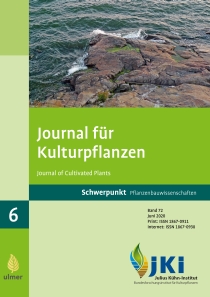The Role of Organic P in the Baltic Sea Region – Lessons (to be) Learned
DOI:
https://doi.org/10.5073/JfK.2020.06.01Keywords:
Eutrophication, manure, variable rate fertilization, soil phosphorus statusAbstract
The Baltic Sea is one of the most eutrophicated marine bodies worldwide. It is essential to develop strategies to close the agricultural P-cycle because only then P fertilization will be sustainable and P losses reduced to an unavoidable minimum. On intact soils that are sufficiently supplied with P in order to achieve the site-specific maximum yield a balanced use of mineral and organic P sources complies with actual plant needs and exclusively replaces P that is removed by harvest products. This is on an average 22 kg/ha* yr P. Algorithms for the variable rate application of mineral and organic fertilizers have been developed and are a suitable tool to match the small-scale spatial variability of plant available soil P with P rates. The milestones of a study carried out in four countries of the Baltic Sea Region are presented. These reveal that on livestock enterprises excessive P rates are applied particularly with pig and poultry manure though the upper quantity of manure equaling 170 kg/ha N is met. This caused P accumulation in soils over time and bears an enhanced risk of P losses by surface run-off and erosion. The result is eutrophication of the Baltic Sea and its water quality in terms of light transmittance has been deteriorating consistently during the past 60 years. Current fertilizer practices on livestock farms and statutory rules in the Baltic Sea Region are not convenient to reduce nutrient discharges to the Baltic Sea in a magnitude that will reduce eutrophication. Based on current data it is estimated that it will take at least 70 years to lower the soil P status from excessive to sufficient if no P is applied. Zero P application where the soil P status is excessive and variable rate application of manure in combination with a strictly demand-driven application of P on sufficiently supplied soils is imperative for a sustainable P use.
Published
Issue
Section
License
The content of the journal is licensed under the Creative Commons Attribution 4.0 License. Any user is free to share and adapt (remix, transform, build upon) the content as long as the original publication is attributed (authors, title, year, journal, issue, pages).
The copyright of the published work remains with the authors. The authors grant the Journal of Cultivated Plants, the Julius Kühn-Institut and the OpenAgrar repository the non-exclusive right to distribute and exploit the work.







